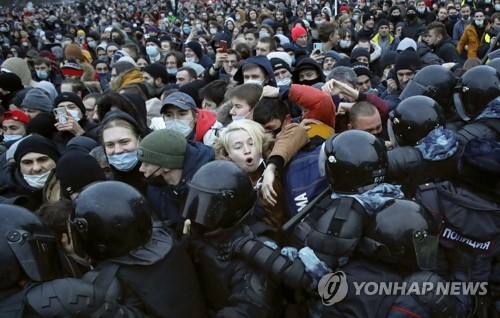US and politicians join forces and offensive in all directions
Russia, even the US ambassador protested
As soon as Biden’s administration was launched, tensions between the two countries escalated
 viewer
viewer
 viewer
viewer
 viewer
viewer
After the US supported a protest across Russia calling for the release of President Vladimir Putin’s political opponent Alexey Navalni, Russian authorities immediately protested, calling it “interference in internal affairs.”
It is known that more than 3,500 protesters were arrested in the protests on the 23rd, and the arrest of Navalni is a sign that tensions between the United States and Russia from the very beginning of the US administration are rising again.
According to the US political media The Hill on the 24th (local time), in the US, following the State Department and the embassy, one after another in the political sphere publicly supported the protests in Russia.
In a statement released the day before, the US State Department said, “The United States strongly criticizes the use of harsh measures against protesters and journalists in cities across Russia this weekend.”
The State Department further pointed out that the Russian authorities’ suppression of Navalni’s arrest and peaceful protests were “a sign of further limiting civil society and freedom,” and added, “We will join forces with allies and partners to protect human rights.”
The US embassy in Moscow also added to the pressures of Russia.
“We are watching reports of protests in 38 cities in Russia and the arrests of participants and journalists in peaceful protests,” said a spokesman for Rebecca Ross on a Twitter account the same day. “The United States is committed to peaceful protests and freedom of expression. “I support the rights of the company.”
“The action taken by the Russian authorities suppresses them,” Ross said. “The Russian authorities arresting peace protesters and journalists seem to be an activity to suppress freedom of speech and peace assemblies.”
In politics, Republican Secretary of the House Foreign Relations Committee, Michael McCall, and Republican Senator Ben Sass, expressed similar positions.
The Russian side immediately protested.
President Putin’s spokesman Dmitry Peskov, in a statement on the 24th, argued that the comments by US officials were intervening in the internal affairs of Russia and instigating Russian illegality.
On the 25th, the Russian Ministry of Foreign Affairs made a protest against the US Ambassador to Moscow, John Sullivan. Mariya Zaharova, a spokesman for the Ministry of Foreign Affairs, said in an interview with his home TV broadcast’Channel 1’that Vice Minister Sergei Liabkov had an interview with Ambassador Sullivan. “The US Embassy in Russia has “It was a firm protest to the US for spreading posts in support of illegal protests in the country.” Zaharova said, “The Russian side has conveyed to the US Ambassador that this post and the statement of the US State Department (concerning the Russian protests) are regarded as interference in the internal affairs of Russia, and also notified the need to strictly comply with Russian laws and diplomatic practices. “He added.
In Russia, on the 23rd, a large-scale protest took place across the country calling for the release of Navalni, who is under arrest.
When it comes to the scale of the protests, Navalni’s announcements, media reports, and Russian authorities’ announcements are mixed. Navalni claimed that more than 50,000 people participated in the protests in Moscow alone and 250,000 to 300,000 people from all over the country.
AFP news agency reported that about 20,000 people in Moscow and 10,000 people in St. Petersburg each participated in the protests.
However, the Russian Ministry of Interior estimated the number of protesters in Moscow at 4,000.
Independent media in Russia reported that more than 110,000 people took part in protests in 110 cities across the country and more than 3,500 people were arrested.
According to OVD-Info, a Russian non-governmental organization (NGO) that monitors the arrests of political prisoners, 3,642 people were arrested across Russia, including 1,439 people in Moscow and 545 people in St. Petersburg.
Navalni, who has consistently criticized President Putin and other Russian leadership, fell into a coma in August of last year due to symptoms of poisoning, but returned home this month after treatment in Germany, but was arrested and arrested shortly after arrival.
Even after his detention, he continued his criticism by releasing a video revealing President Putin’s luxury resort on social media, and his supporters held a demonstration calling for his release.
< 저작권자 ⓒ 서울경제, 무단 전재 및 재배포 금지 >
